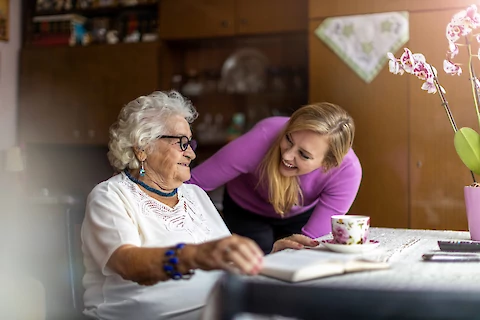
Caring for a senior loved one is rewarding. When a dementia diagnosis is added to the mix, it can feel overwhelming. As a caregiver, you need to understand the changes dementia brings and how they will impact your caregiving responsibilities. Discover some of the changes you can expect.
Initial Changes in Caregiving Responsibilities
Dementia affects individuals differently. As it progresses, you may find that your caregiving responsibilities begin to change. Increased monitoring and supervision will become necessary to ensure your loved one's safety. You may also need to adjust their daily routines and schedules to accommodate their changing cognitive abilities. Creating a safe and comfortable living environment is essential, and this may involve removing hazards, installing safety devices, and making adaptations to their living space. Additionally, introducing memory aids and reminders such as labels, calendars, and alarms can help your loved one maintain a sense of independence and better manage the day-to-day challenges of living with dementia.
Emotional Impact on Caregivers
Caring for someone with dementia can take an emotional toll on caregivers. Feelings of sadness, guilt, and frustration are common, especially as you witness your loved one's cognitive decline. You should acknowledge these emotions and allow yourself space to process them. Increased stress is a natural part of caregiving, but it can lead to burnout if not managed properly. Prioritizing self-care and seeking support from friends, family members, or professional services can alleviate some of the emotional strain you may experience.
Long-Term Changes in Caregiving Responsibilities
As dementia progresses, the level of care and assistance required will increase. You may find yourself assisting your loved one with personal care and hygiene tasks such as bathing, dressing, and grooming. Managing challenging behaviors and mood changes can be taxing, but remaining patient and understanding that their actions are driven by the disease can help you navigate these difficult moments. As dementia advances, your loved one may require increasing medical attention, necessitating regular appointments, medication management, and treatment decisions. Throughout this journey, you'll need to consider long-term care options and plan for the future to ensure your loved one receives the care they need.
Resources for Dementia Caregivers
Luckily, there are many resources available to support caregivers of individuals with dementia. Local support groups and workshops can provide invaluable guidance as well as a sounding board for sharing experiences and finding solace in the company of others in a similar situation. Online forums and educational materials can also offer helpful tips and information on dementia caregiving responsibilities. Professional in-home care services, like those offered by Senior Helpers, can provide tailored support and respite for caregivers.
Senior Helpers St. Petersburg Provides Care for Seniors With Dementia
Navigating the challenges of dementia caregiving responsibilities may feel daunting at times, but remember that you're not alone. You should prioritize self-care and seek support from others in similar situations, which will help you provide the best possible care for your loved one. For those living in St. Petersburg, Gulfport, South Pasadena, St. Pete Beach, and Treasure Island, consider reaching out to Senior Helpers St. Petersburg for professional, compassionate in-home care services tailored to your unique needs. Our team is here to support you every step of the way.